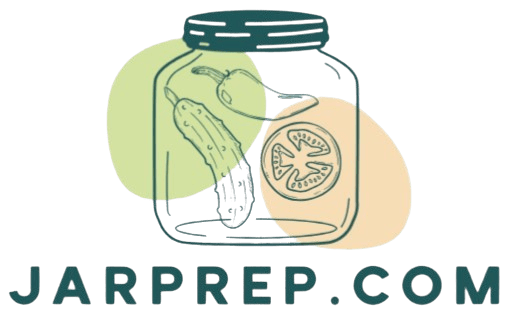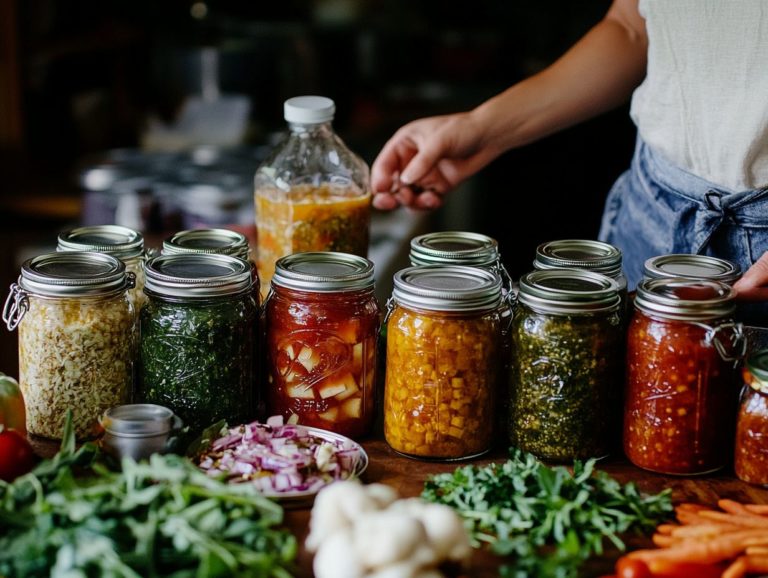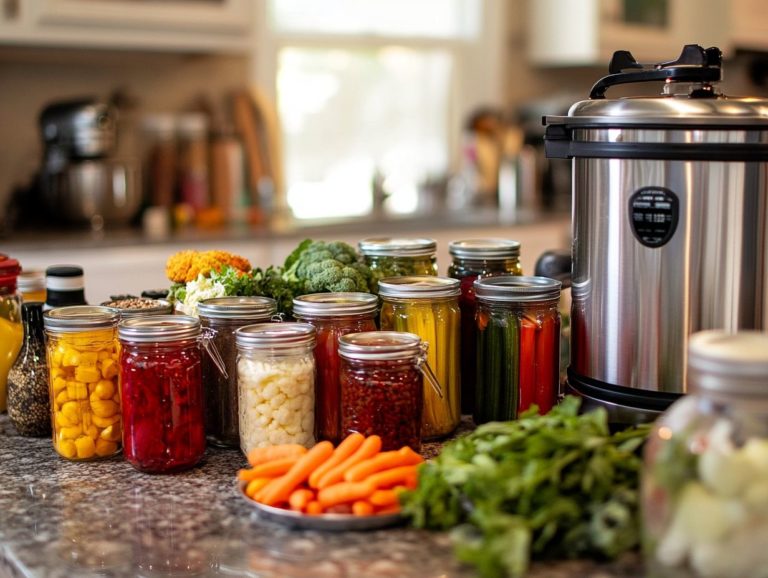How to Properly Label Canned Foods
In a world where convenience often takes center stage, understanding the significance of proper labeling on canned goods is vital for both safety and nutrition.
Accurate labels truly matter. It’s essential for you to know what key information to seek out and how to interpret expiration dates correctly.
You’ll discover best practices for storing canned goods and learn how to read nutrition labels effectively.
Whether you’re preparing for emergencies or planning meals, knowing what’s inside those cans can make all the difference. Jump in now to boost your food safety and take charge of your health!
Contents
- Key Takeaways:
- The Importance of Properly Labeling Canned Foods
- What to Look for on Canned Food Labels
- Understanding Expiration Dates on Canned Foods
- How to Properly Store Canned Foods
- Reading Nutrition Labels on Canned Foods
- Frequently Asked Questions
- What are the essential components of a proper label for canned foods?
- Why is it important to properly label canned foods?
- Can I use my own labels for canned foods?
- How can I ensure my canned food labels meet labeling regulations?
- What should I do if I notice a discrepancy on a canned food label?
- How long can canned foods be stored with proper labeling?
Key Takeaways:
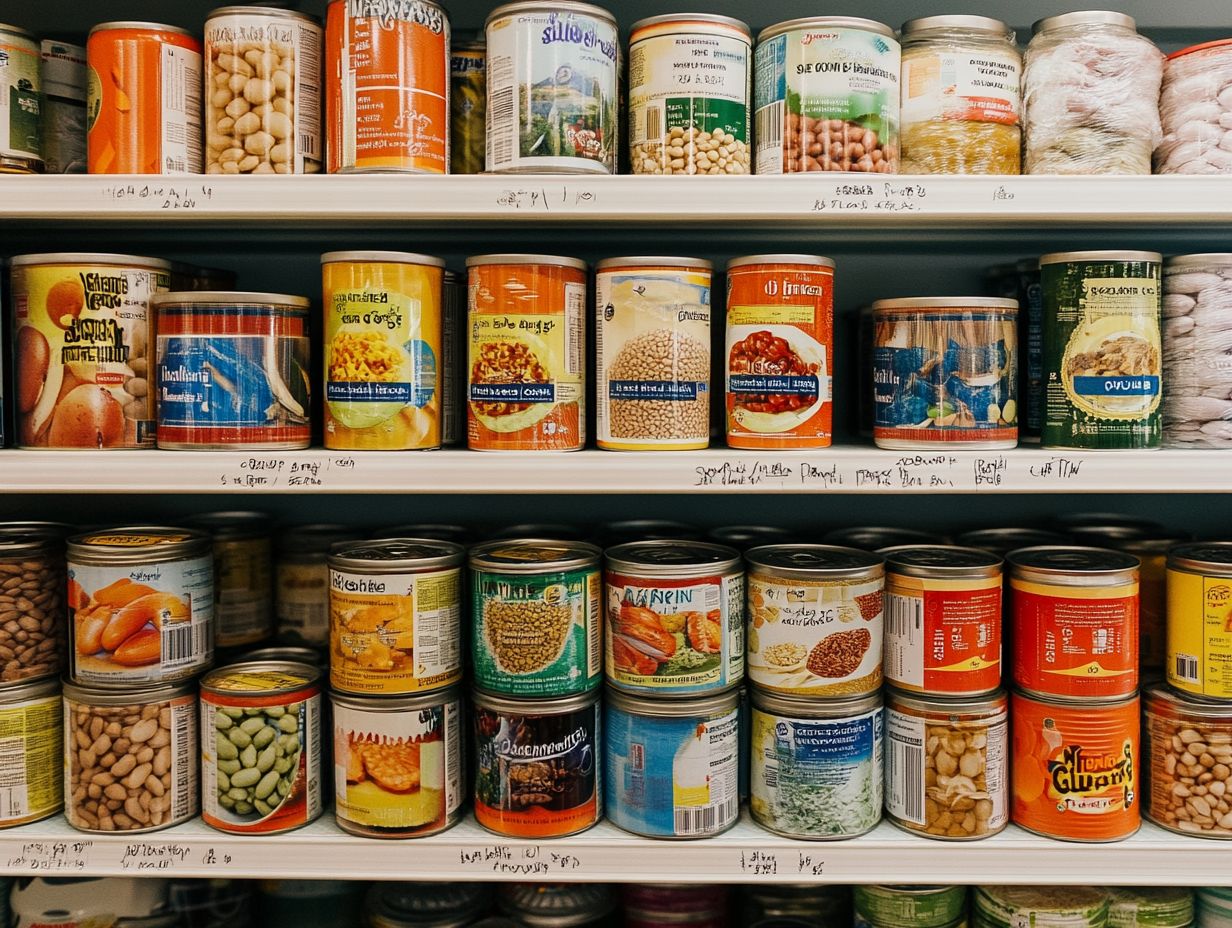
- Properly labeling your canned foods is key to ensuring accuracy and safety.
- Look for essential information, including expiration dates and nutrition labels.
- Understanding the different types of expiration dates and how to store canned foods ensures longevity and informed choices.
The Importance of Properly Labeling Canned Foods
Labeling your canned foods properly is crucial for food safety. It ensures that the contents are easily identifiable, helping you and others to be aware of any potential allergens, and following the do’s and don’ts of canning can further enhance safety.
Effective labeling practices elevate the appeal of your homemade gifts, like cherry marmalade or strawberry jam, while also conveying essential information about the processing method, ingredients list, and batch number for traceability.
This transparency fosters confidence in your home canning and preserving efforts, making your creations even more delightful for everyone who enjoys them.
Why Accurate Labels Matter
Accurate labels on canned goods are essential for maintaining food safety and ensuring you, the consumer, are well-informed about potential food allergens.
These labels provide critical details about ingredients and also play a vital role in identifying batch numbers for tracking purposes. Inaccurate labeling can lead to significant risks, including health complications, allergic reactions, and even serious medical emergencies. Trust in the clarity of information on labels is key to your overall safety.
During a product recall, clear and accurate labels are essential, helping respond faster to protect public health. Without precise labeling, confusion and misidentification can increase, which could have serious repercussions for individuals with specific dietary needs.
What to Look for on Canned Food Labels
When you examine canned goods labels, focus on key details such as nutritional information, the ingredients list, and any food allergens that could impact your health.
These elements are vital for making informed choices about what you consume.
Key Information to Identify
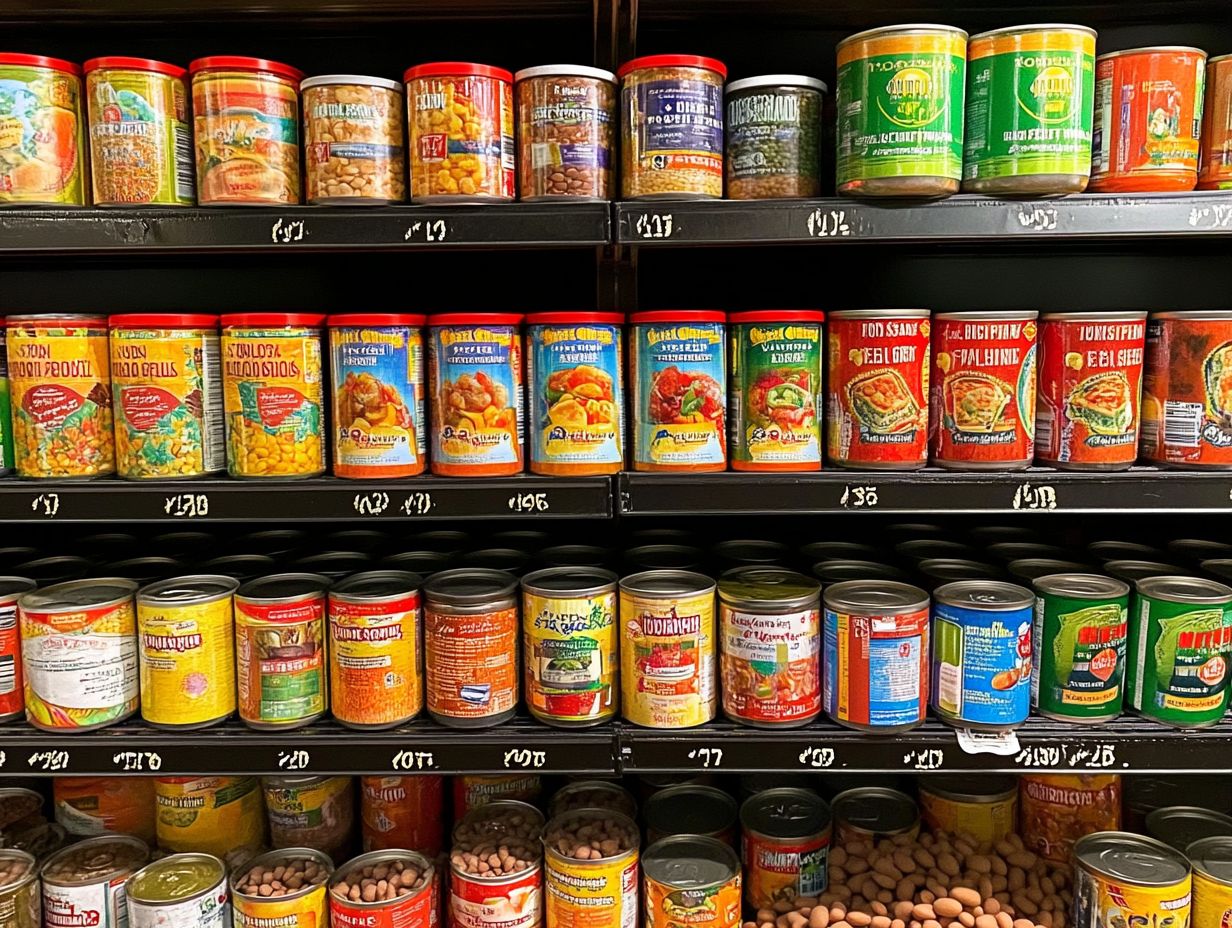
Key information on canned goods includes the nutritional labeling, which offers valuable insights into calorie count, vitamins, and minerals present in the food, along with the ingredients list.
Understanding these details can greatly influence your dietary choices and overall health. The nutrition label reveals vital information, including serving size and a breakdown of main nutrients like fats, carbohydrates, and proteins, enabling you to better balance your meals.
Check for batch numbers, as these help trace the product s origin in case of recalls or safety alerts. Being aware of potential food allergens, clearly marked in the ingredients list, is crucial if you have sensitivities or allergies, ensuring safe consumption and minimizing health risks.
Understanding Expiration Dates on Canned Foods
Understanding expiration dates on canned foods is essential for maintaining food safety and ensuring optimal consumption. These dates signal the peak quality and potential safety of canned goods as they age, allowing you to make informed decisions about what to enjoy and when.
Interpreting Different Types of Dates
Interpreting the various types of expiration dates on canned foods is crucial for assessing the safety and quality of the products you buy.
Understanding the differences between ‘best by,’ ‘sell by,’ and ‘use by’ dates can significantly enhance your decision-making process. ‘Best by’ dates indicate the peak quality of a product, but they don t imply that the food is unsafe after that date. The ‘sell by’ date is primarily intended for retailers to manage shelf life. In contrast, the ‘use by’ date indicates the last chance for optimal quality.
Don t forget to consider the storage conditions and check your food visually, as these elements greatly affect safety and edibility. With a bit of knowledge, you can confidently navigate these dates, reducing waste while ensuring your meals remain delightful.
How to Properly Store Canned Foods
Proper storage of canned foods is vital for preserving their quality and safety, ensuring that your homemade gifts and home-canned delicacies stay delicious and safe for consumption over time.
By taking the right precautions, you can enjoy the fruits of your labor without worry.
Best Practices for Longevity and Safety
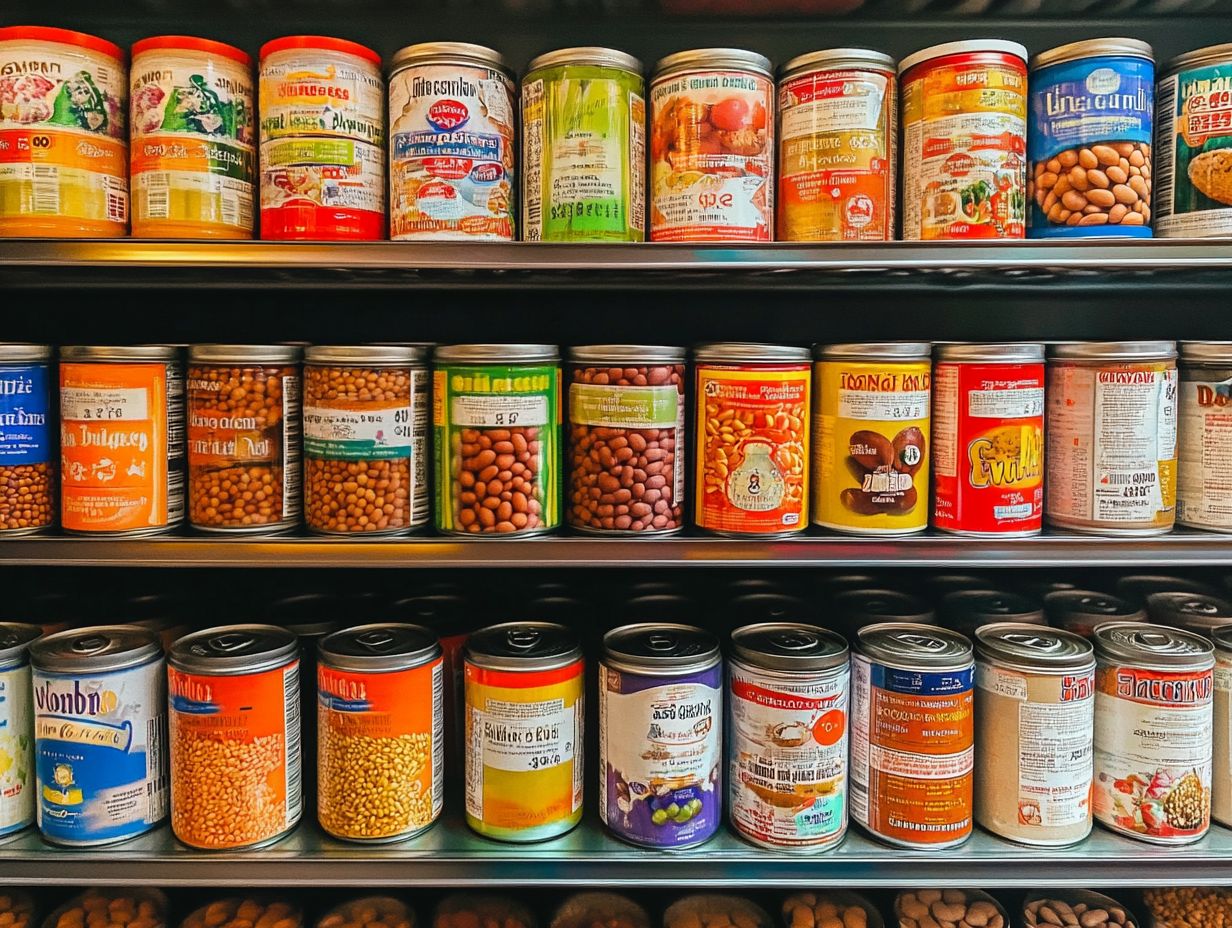
Implementing best practices for the longevity and safety of your canned foods is essential in home canning, ensuring your preserved goods remain fresh and safe to consume for an extended period.
To achieve this, store your canned items in a cool, dark place away from direct sunlight and temperature fluctuations. Choose sturdy containers, ideally made of glass or BPA-free plastic, to help maintain the integrity of the food inside.
Make it a habit to regularly inspect your cans for any signs of spoilage, such as bulging lids or rust spots; these can be red flags that the contents are no longer safe to eat. To maximize freshness, adopt the first-in, first-out (FIFO) method by rotating older cans to the front of your pantry.
Prioritizing food safety in your storage practices not only prolongs shelf life but also encourages healthier eating habits.
Reading Nutrition Labels on Canned Foods
Reading nutrition labels on canned foods is crucial for making informed choices about your dietary intake. It helps you understand the nutritional benefits and potential allergens present in the product, ensuring you select options that align with your health goals and preferences.
Making Informed Choices
Making informed choices when selecting canned foods requires a thorough understanding of nutrition labels and awareness of any food allergens listed.
It s essential to go beyond just skimming the ingredient list; take the time to familiarize yourself with the nutritional values presented on the packaging. This diligence allows you to pinpoint options that meet your specific dietary needs whether it s managing calorie intake, reducing sugar or sodium levels, or avoiding particular allergens.
If you have food sensitivities, a careful inspection of allergen statements will guide you away from unwanted ingredients. By choosing products that emphasize whole ingredients and minimal additives, you can enhance your meal planning, ensuring that each choice is both delicious and aligned with your nutritional goals.
Frequently Asked Questions
What are the essential components of a proper label for canned foods?
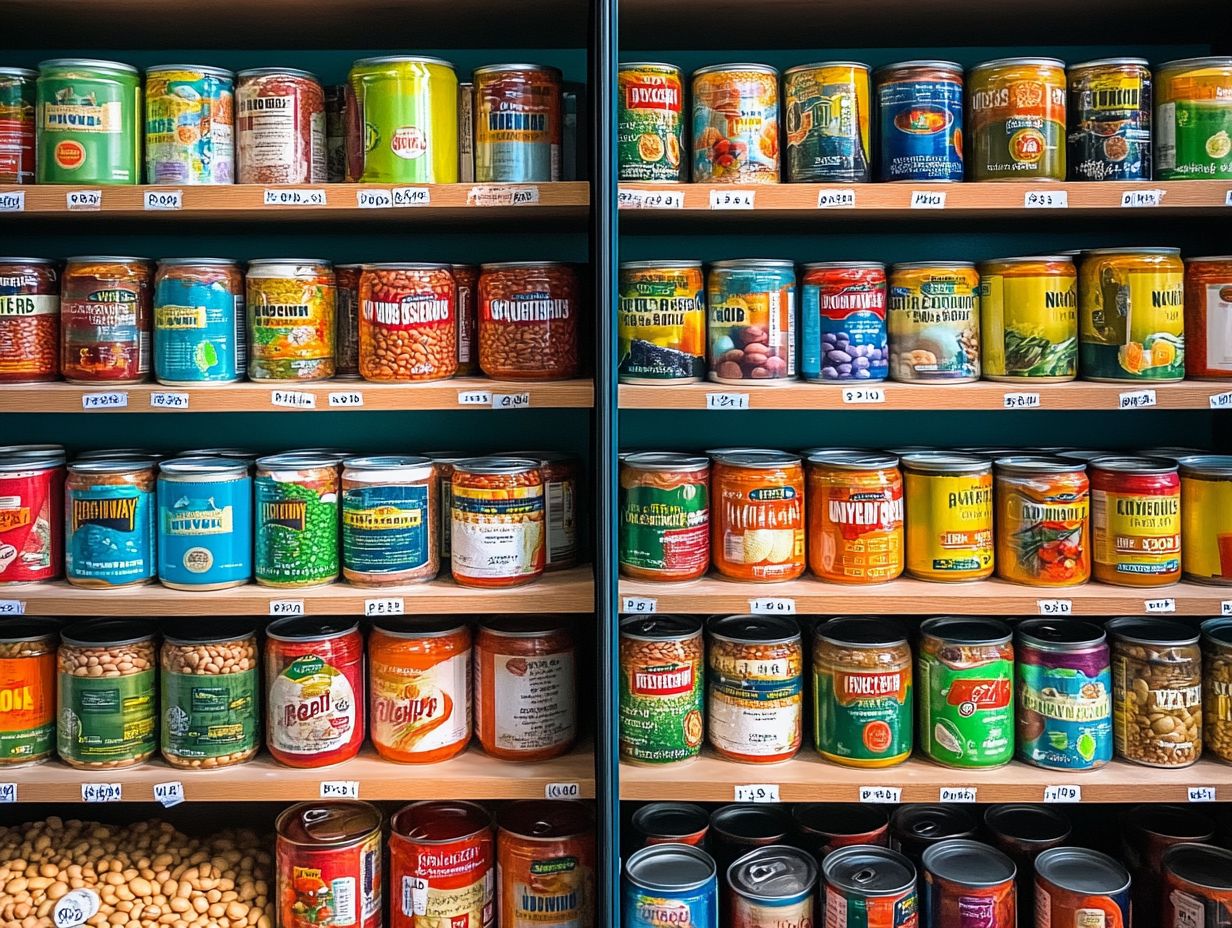
A proper label for canned foods should include the product name, ingredients list, net weight, manufacturer information, and how to properly store canned foods.
Why is it important to properly label canned foods?
Proper labeling of canned foods is important for consumer safety, as it provides essential information about the product’s ingredients, nutritional value, and storage instructions.
Can I use my own labels for canned foods?
No, it is important to use the labels provided by the manufacturer to ensure accurate and up-to-date information. Homemade or altered labels may not meet labeling regulations and could pose a safety risk.
How can I ensure my canned food labels meet labeling regulations?
Carefully read and follow the labeling rules set by the FDA and other agencies.
Provide accurate information, use clear fonts, and avoid misleading claims.
What should I do if I notice a discrepancy on a canned food label?
If you spot a discrepancy on a canned food label, like a missing ingredient or incorrect weight, contact the manufacturer.
Reporting it helps keep labeling accurate and protects consumer safety.
How long can canned foods be stored with proper labeling?
Canned food shelf life depends on the type and how it s stored.
Always check the expiration date and follow storage instructions to keep the food safe and high quality.
